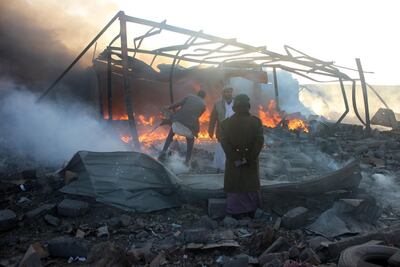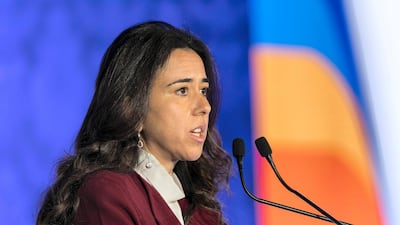The passage of a UN resolution holding Iran to account for supplying missiles to Houthi rebels in Yemen will be critical in stopping the proliferation of such weapons to other extremist groups in the region, the UAE Ambassador to the UN says.
An effort led by Britain to win Security Council backing for renewed sanctions related to the war in Yemen for another year includes condemnation of Iran for breaching an arms embargo on the country, which has been hit by a civil war since 2015.
Russia has pushed back against the draft resolution but it is hoped that it could be passed today.
“The UAE supports a proposed resolution to renew sanctions against those fuelling the conflict in Yemen, which has been put forward by the UK,” Lana Nusseibeh, Permanent Representative of the UAE to the UN, told The National in an interview in Abu Dhabi.
“The draft resolution expresses concern about Iran supplying missiles to the Houthis, which we think is essential. Countries who continue to violate UN Security Council resolutions need to be held accountable, otherwise their actions will continue and we will see the ongoing proliferation of missile technology to the Houthis and to other groups in the region.”
The Houthis have fired missiles at Saudi Arabia recently, and last week, UAE air defences shot down a ballistic missile fired by rebels in Yemen's south-eastern port city of Mocha.
An Arab Coalition led by Saudi Arabia, of which the UAE is a key member, has been supporting the internationally recognised government in its fight against the Iranian-backed Houthis.
Nikki Haley, the US Ambassador to the UN, said last week that it was time for the Security Council to act.
Ms Nusseibeh said: “The attacks on Saudi Arabia, the attempted attacks in the region and the ongoing efforts to destabilise Yemen by arming the Houthis are unacceptable and have to be condemned by the international community.
“Furthermore, the political process needs to be re-energised. We look forward to working with the new UN Special Envoy Martin Griffiths and his office.
“His predecessor, Ismail Ould Cheikh Ahmed, has done very important work under incredibly difficult circumstances and we believe that this has produced elements for a political roadmap.
_____________
Read more:
Arab Coalition intercepts five Houthi missiles fired at Marib, Yemen
UAE shoots down Houthi missile over Mocha, Yemen
US presents evidence that Iran supplied missile fired at Riyadh by Houthi rebels
Iran-Houthi missiles post significant threat to Saudi Arabia and Emirates, says Al Otaiba
_____________
“The UAE and other members of the Coalition support the UN Envoy’s mandate [and the Secretary General] in applying pressure on the Houthis to come to the negotiating table, and denouncing their acts of violence.
“There are other dangerous elements in Yemen that need to be taken into account. Violent extremists have had a consistent presence in the country, and they remain a fundamental challenge to the UAE and the region.
“This is why our country for the past 15 years has been a leading supporter of the Yemeni government in the fight against these groups.”
Ms Nusseibeh said that the most pressing issue in Yemen was the humanitarian situation.
“The UAE and Saudi Arabia have recently announced a very generous joint humanitarian aid package to be disbursed through the UN system to all those in need throughout Yemen,” she said.
When asked how long believed it would take the Houthis to come to the negotiating table, Ms Nusseibeh said: “At the end of the day the solution in Yemen has to be Yemeni-led. The Yemeni people need to decide when the time is right for negotiations to move forward.
“It is important to realise that the Houthis represent only a very small part of the Yemeni population. They need to be part of the solution but they cannot be allowed to dominate the conversation.

“I think all Yemeni parties and the Yemeni people need to be able to play an active part. The UAE is the long-term partner of the Yemeni people in this process.
“We have a strong cultural, historical, and political connection to the Yemeni people, and these ties will transcend the current conflict. Today we are in Yemen at the request of the legitimate government of Yemen and we will remain there as long as we are needed.”
On Saturday night the UN Security Council voted in favour of a 30-day ceasefire across Syria prompted by unrest in the Damascus suburb of Eastern Ghouta.
“This year we have to find a solution to the Syrian conflict,” Ms Nusseibeh said. “There is no other forum to negotiate peace settlements that has the universal legitimacy of the UN, and we now more than ever need to work together to alleviate the humanitarian suffering in Syria.”
The UAE had joined international calls for a ceasefire in Syria out of concern for civilians’ well-being.
“Alleviating the humanitarian suffering has to be the number one priority. While there are challenges ahead of us, we need to maintain the pressure to find a resolution to the conflict.”
The UN Security Council vote that was expected to take place on Friday had been delayed to Saturday, after Russia argued that a ceasefire was unrealistic.
Ms Nusseibeh said before the vote: “The UAE supports the draft resolution put forward by Kuwait and Sweden at the Security Council calling for a ceasefire to ensure that humanitarian aid reaches civilians who are most in need, particularly the women and children.
“We support the UN framework to guide all parties to reach a political settlement, which is the only way forward. This includes the efforts of Staffan de Mistura, the UN Special Envoy for Syria, to find a solution.”


